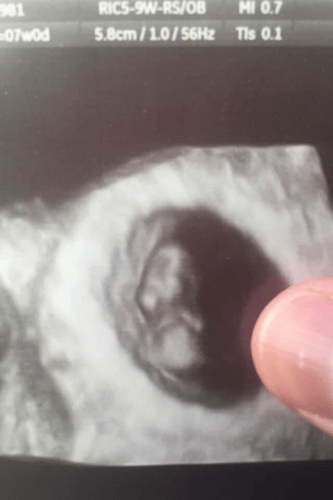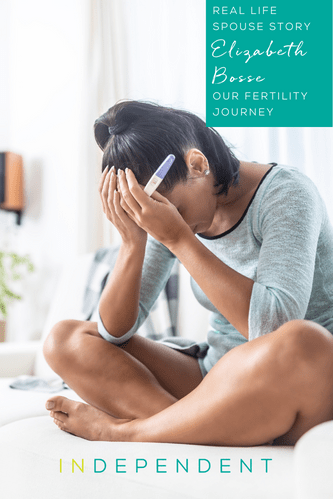
The Real Life Spouse Stories Series is part of InDependent’s Wellness Unfiltered™ program. It’s a platform for military spouses to share their struggles with tougher wellness topics. They’re sharing these stories to help with their healing, open up conversations so other military spouses know that they aren’t alone, provide resources to people struggling with something similar, and to help the community know how to better help others who are going through difficult wellness issues.
Our Fertility Journey

A journey we never thought we would take but a journey that lasted almost 10 years.
Brian deployed right after we got married. In fact, the deployment was why we got married so fast. He came home fourteen months later, and we decided that was a good time to try to start a family. Since I had a full-time job with amazing health care, I used Tricare as my secondary insurance. A year into trying, we began our fertility journey and the tests began in earnest. We had blood work, sperm count test, ultrasounds, and an HSG. HSG is a procedure where they shoot dye through your fallopian tubes to make sure there is no blockage. All tests came back clear. We even got glowing reports back on some of them. “He must have worn combat boots to protect his sperm the count was so high and strong,” the nurse told us when she called with the results. Since my tubes were also clear, we were diagnosed with “unexplained infertility.” Right after that, we got orders to move to Italy.
Once we were settled in our new home, we began to meet with the doctors on post for our fertility treatments. There was a doctor who specialized in hormones, and we were thrilled. The doctor wanted us to start with Clomid, a medication that stimulates the hormones that support the growth and release of mature eggs. Typically, you start this medication at the lowest dosage and work your way up after each unsuccessful cycle. We did six cycles and then it was deployment time. The best thing about deployment for us at that time was we no longer had to worry about taking the medicine or having timed intercourse. Clomid can have some gnarly side effects and I experienced many of them. It was not a fun six months.
TREATMENTS OVERSEAS
Upon returning home from that deployment, we moved to Germany. We were at a small duty station and were immediately referred off post for fertility treatments and also to an endocrinologist. The endocrinologist wanted to remove my thyroid as soon as possible and that meant the fertility treatments had to be put on hold. Every time something new happened it felt like our dream of having a family slipped further and further away. I was turning 30 that year and so many people wanted to know when we would be having children. It was a hard few years. Once cleared to begin treatment we started working with a German doctor. We laid out everything we had done up to that point and formed a plan. Little did I realize how big the language barrier was until the next year. This time we were prescribed medication to help with egg growth and had monthly ultrasounds to measure the eggs and their growth. We did nine rounds of this and then you guessed it, time to move again.

We moved a lot in those beginning years. We were off to California this time and I was relieved that we would no longer have a language barrier in the way of starting our family. We found an amazing doctor who did an ultrasound of my ovaries and fallopian tubes. He found some concerning things and wanted to do surgery to see the actual condition of my tubes. It was at this point that we found out how big the language barrier had been in Germany. We told our doctor in Germany that we had already done six rounds of Clomid and he informed us we were taking a different medication. Unfortunately, the medication actually was Clomid and I ended up taking a medication that is supposed to max out at six months for fifteen months. My fallopian tubes paid the price. They were full of scar tissue and had grown in one spot to almost form a bubble where the doctor thought the eggs were getting stuck on their way down. He told us the only way forward was IVF. I was devasted. We both were at a loss. We knew at the time there was no way forward because we were off to another foreign country.
Manila was the hardest duty station for me yet. Living in Manila is hard and without kids, for me, it was even harder. Every time we got into a taxi or spoke with a shopkeeper they asked about our children. At this point in Brian’s career, all his co-workers and all our friends had children. It was a very lonely time for me. Every day there were countless reminders of our childless home. We decided to try again and found a doctor there. Tricare would cover all the diagnostics but none of the treatments. Thankfully this was affordable in Manila. This time we did one month. The medication we were given was Letrozole. This medication is also used in breast cancer patients. We did get pregnant but miscarried very early. It was so early I hadn’t even taken a pregnancy test. At this point in our journey, I was petrified of pregnancy tests. All they did every month was show my failure to start a family. Having a miscarriage so far from family and friends nearly broke me.
We decided to stop trying.
LOOKING AT NEW OPTIONS
This time we moved to Boston. Our time in Boston was so good. Brian was in grad school, and I was volunteering at a yoga studio. We had so much time together. We ate and traveled and went to so many movies. It was a great reset year for us. It was here we decided to investigate adoption. We talked with an adoption agency and started filling out the application. Before we turned it in, Brian got the lists for the next jobs to rank. All the jobs were overseas. We talked to the adoption agency, and they said there was no way they could work with us while overseas. We felt at a loss and didn’t know how to go forward. This was when we decided to give IVF a try.
We called Walter Reed Medical Center to see if we might be able to get accepted into their IVF program. It would still be very expensive but with the grant that covered the medication, it would be greatly reduced. We took a long weekend to go down for all the tests and then after several months of waiting, we were accepted and got dates for the treatment. Brian was in the middle of his dissertation, but Walter Reed said he only needed to be present for the day they extracted my eggs. He had to be there that day to supply his contribution and to drive me after my procedure. Leading up to the egg retrieval day, I stayed with a friend. I gave myself countless shots. Let me tell you if you have never given yourself a shot, that first time is hard! I nearly threw up with the anticipation. For fourteen days I gave myself four shots a day and went in for ultrasounds every other day. It was exhausting, physically, mentally, and emotionally. After the egg retrieval, there was only one shot left and that would be done a certain number of hours before the transfer. It was the HCG trigger shot. The needle was huge, and I had to mix the medication myself. It was nerve wracking. The friend I was staying with had to give me the shot because it was intermuscular and on my rear end. The nurse at Walter Reed had kindly drawn a bullseye for her to know where it was to go. I drove myself at the appointed time for the transfer. Brian was already back in Boston.

We only had one viable embryo after the whole IVF process. After the transfer, I had to start three times daily progesterone suppositories and then have two blood tests to check my HCG hormone levels before we could be sure. I was back at Hanscom at this point and did all my lab work at a local hospital and OB’s office.
And then, I was pregnant. After 9 years of trying, we were pregnant.
I remember the first ultrasound we had. We cried and cried. I had to continue to use the progestogen suppositories well into my second trimester because of spotting. It was a long and anxious pregnancy. It was hard to rest easy and not let anxiety rule the entire nine months. We had our daughter in Virginia nine months later. IVF pregnancies seem to last longer because you find out much sooner that you are pregnant, and the pregnancy is measured on a slightly different timeline.
We went through much of our journey silently. It wasn’t until Harper was about a year old that I realized how many other military families traveled this journey and I began to be vocal about our story. I have since shared our story with many other families, both friends, and strangers (that other friends have connected with me). Know that if you are on this journey, you are not alone. There is someone out there who sees you and can offer an ear, a hug, or a text message.
Additional Resources
Tricare Covered Services
Operation Baby
Fertility Lifelines – Compassionate Care Program
The Bob Woodruff Foundation’s Veterans In Vitro InitiAtive (VIVA)
Resolve: The National Infertility Association
Adoption Reimbursement
Military One Source Adoption Resources
National Military Family Association Adoption Resources

ABOUT ELIZABETH

Elizabeth Bosse is a yoga teacher, reiki master and teacher, and writer. As the creator of the blog WellnessWildernessWithElizabeth she is building a program to take wellness on the move. As a military spouse of 15 years and mother of a young daughter, Elizabeth has had a lot of practice maintaining wellness through changing circumstances, developing her philosophy through 9 moves (5 of which were overseas), 2 deployments, and 1 evacuation. She has a master’s degree in social work from the University of Alabama and experience in hospice. In her spare time, Elizabeth enjoys running, swimming, reading, practicing and teaching yoga, and traveling.

